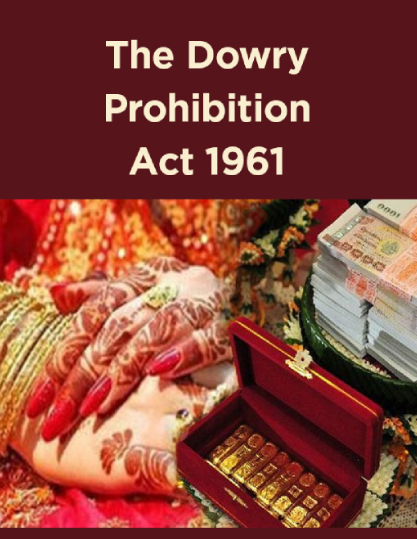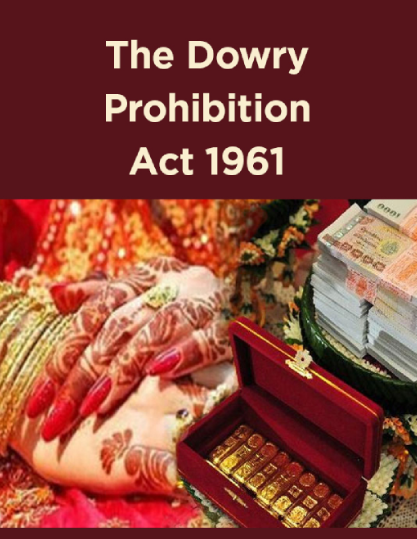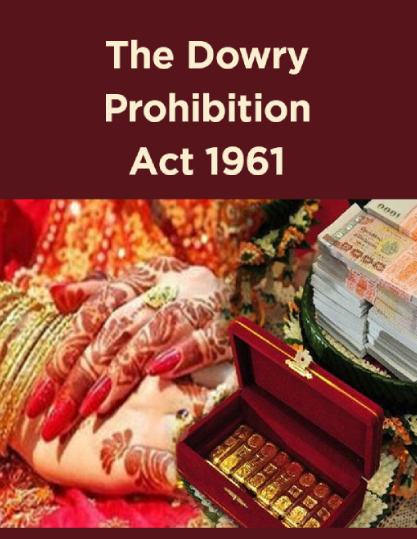Why this Act was passed ?
- To eradicate the Evil Custom from the Society. To free the Society from this menace.
- To free the Women folk from the atrocities committed on them by the Husband & In-laws for want of DOWRY.
- Many families were destroyed & Parents of the Bride drowned in Debts. To save their lives from the Evil Custom.
- To save numerous married women from committing Suicides.
- To STOP DOWRY DEATHS / MURDERS.
Background of the Act
- Though Marriage is a need for both Men & Women, however only Bride is considered needy by the Society.
- Groom’s side enjoyed Superior Status in Marriage Function, where as Bride’s side is look low & inferior.
- It is customary that Bride’s Parents should shower the Groom and his family members with rich and costly Gifts.
- It became a unwritten rule to gift a Daughter bedecked & bejewelled with costly Cloths, Ornaments & Presents to a Groom in KANYADAAN.
- These Customs gave more importance to Groom’s side & Birth of a Baby Boy became compulsory in the family. Resulting in refusal to a Baby Girl’s Birth.
- Many Girls belonging to noble families remained unmarried due to inability of their parents to meet the exorbitant demands of the groom’s side. There have been instances where such girls are compelled to commit Suicide because a girl remaining unmarried after the marriageable age is considered a dishonor to the family.
Extent & Commencement
- This Act received assent of the President of India on 20th May 1961.
- Publicity of notification in the Official Gazette on 20th June 1961.
- This Act came into force on 1st July 1961.
- First Amendment 1984 came into force on 2nd October 1985.
- Second Amendment 1985 came into force on 19th November 1986.
Definition of Dowry
- Any thing, Property or Valuable security offered or accepted, given or agreed to be given either directly or indirectly by parents of either party to the marriage to another party to the marriage in consideration of the marriage.
- The above definition was amended in the year 1984. This important change was in the word ‘consideration’ which was changed to ‘connection’.
- The above definition was amended in the year 1986 by substituting the words “or any time after the marriage” for the words “or after the marriage”.
- Any Presents received by the Bride or the Groom at the time of the marriage in form of Cash, Ornaments, valuables, Cloths, Articles shall be deemed as DOWRY. Unless it is proved that it was not in connection of the Marriage.
Demand of Dowry
- According to the Section 4 of the Act only making Demand for DOWRY is Crime and if proved in the court of Law, punishment of 6 months to 2 years of imprisonment with Rs.10,000/- fine (both together) is provided.
- According to sub section 4(a) giving advertisement for marriage with such condition is crime and liable for punishment of 6 months to 5years imprisonment with Rs.15,000/- fine (both together)
Stree-Dhan & Dowry
- If anybody other than Bride has accepted any Dowry before, after or during her marriage on her behalf the same is to be returned/given to her with in 3 months or else the person responsible will be liable fro punishment of 6 months to 2 years of imprisonment & fine on Rs.10,000/- The Court can give orders to the person concerned to transfer the property in the name of the Bride.
Cognizable Offence
- According to the section 7 of the Act Offering and Accepting DOWRY is a Cognizable Offence. The cases under this Act are taken before First class Judicial Magistrate OR Metropolitan Magistrate.
- Cases can be filed on the basis of self information OR Police Report OR information from Parents/Relations OR complaint from any organization.
- There is no time limit stipulated for filing case under this Act.
Non Bailable Offence
- Offence under this Act is cognizable and non-bailable offence.
- The culprit can be arrested without Warrant OR without Magistrate’s Orders.
Non - Compoundable Offence
- The Offence under this Act is Non-compoundable offence, which cannot be settled out of court.
Strict Liability
- According to Section 8 (a) of the Act, the culprit has to prove that he is not guilty and that he has not accepted any Dowry. The culprit has to prove with evidence that he has not committed any offence under this Act. This rule is called Strict Liability.
Dowry Prohibition Officer
- According to the Section 8 (b) State Govt. has to appoint Dowry Prohibition Officer who has to ensure that :
- Provisions under this act are implemented strictly in all the Districts.
- To stop Dowry transactions.
- To collect enough evidences to make the case strong
I.P.C.498-A
- Amendment of Indian Penal Code 1860 : The Indian Penal Code has been amended by Act to make cruelty to a woman by her husband or any relative of her husband punishable with imprisonment for a term which may extend to 3 years & also with fine.
- Atrocities committed on a women by her husband or her in-laws and forcing her to meet their unlawful demands will attract punishment of imprisonment & fine.
I. P. C. 306
- According to Indian Evidence Act Section 113-a if atrocities are proved and a woman dies a unnatural death with in seven years of her marriage, the Court will presume or take for granted that she has been driven towards suicide by her husband or relatives of her husband or in-laws. In this situation under I.P.C.306 provision of 10 years imprisonment & fine is made.
Dowry Death
- Indian Penal Code Section 304-b provides definition of Dowry Death. In case a woman dies a unnatural death with in 7 years of her marriage and it is proved that before her death she was subjected to cruelty by her husband or in-laws it will be presumed by the court that the death is DOWRY DEATH. In terms of Indian Evidence Act Section 114 provision of life imprisonment is there.
Implementation
- Though the Dowry Prohibition Act 1961 is very Stringent the fact is that 86% of Criminals are set free for want of evidence. Atrocities can not be proved due to lack of evidence.
- According to National Crime Records Bureau every 77 minutes there is one DOWRY DEATH in India.


